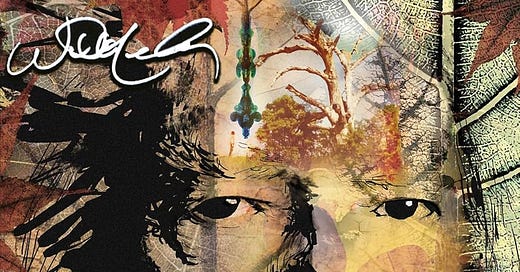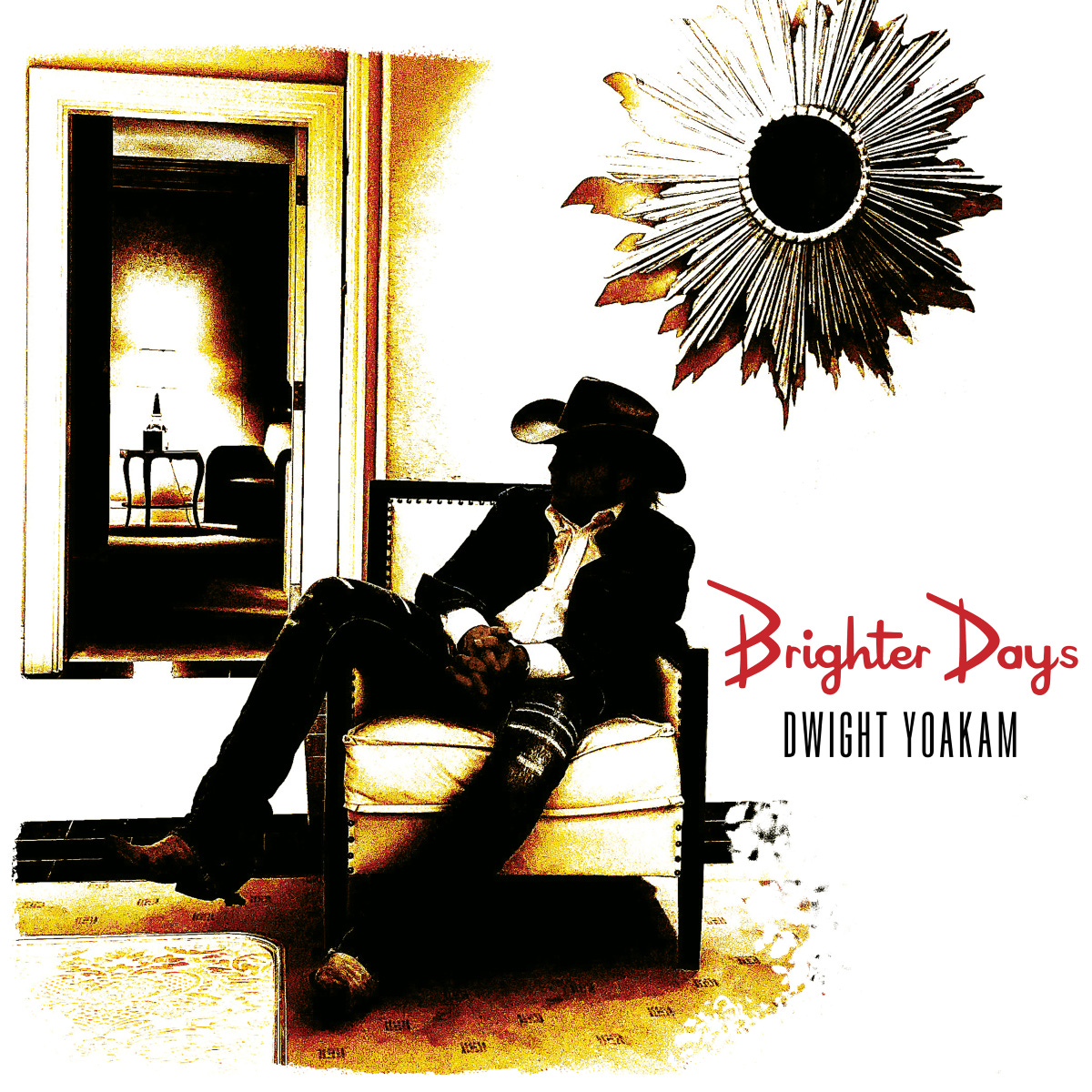Still Standing
On his most surprising album in years, Willie Nelson stares down mortality. Meanwhile, Dwight Yoakam is reinvigorated by marriage and fatherhood.
Willie Nelson - Last Leaf on the Tree
“I don’t want to be the last man standing/ Or wait a minute, maybe I do,” Willie Nelson once quipped. It wasn’t the first time and it wouldn’t be the last time he would joke about his own mortality. Now 91 and releasing albums with astonishing prolificacy— he’s up to two releases this year alone, a pace that’s become standard for the country veteran— Nelson clearly has legacy on his mind, churning out music with a consistently high level of quality, much of it deliberately focused on the passage of time and the inevitability of dying.
The latest is Last Leaf on the Tree, its very title suggesting a sober-minded, autumnal mood. But if the record is thematically of a piece with Nelson’s other latter-day output, it’s also a sonic outlier. Sounding distinct from anything else in Nelson’s catalog, Last Leaf on the Tree builds on the spare, haunted feel of Nelson’s classic work from the 1990s (specifically the landmark albums Spirit and Teatro) while also offering fresh, modern production choices.
It’s an appreciably different animal from some of the more classicist, meat-and-potato country albums Nelson has been making in recent years, including fine projects like Last Man Standing and A Beautiful Time. Much of that comes down to a new producer: While Nelson has lately preferred to work with boon collaborator Buddy Cannon (at 77, a real whippersnapper compared to Nelson), Last Leaf on the Tree finds him teaming with his 34-year-old son Micah.
Micah makes experimental music under the name Particle Kid, and has recorded cinematic scores for a number of well-loved video games; on Last Leaf on the Tree, it’s clear that he reveres the sonic character of his father’s classic albums, but is uninterested in rote recreation. The sound of this open is atmospheric, wide-open, leaving ample room for Nelson’s weathered growl and the rustle of his nylon-stringed guitar— in fact, this is the most room to roam Trigger’s been given in a long time, and it’s a joy to hear Willie just play.
Yet this isn’t exactly a back-to-basics record: It’s haunted by spectral, ambient sounds, ranging from Daniel Lanois’ moaning pedal steel to ethereal electronica effects. And there are rhythms, too, many of them supplied by Doors drummer John Densmore: On a cover of Sunny War’s “If It Wasn’t Broken,” a rumbling Tejano groove recalls the hip-shaking, south-of-the-border adventures of the Teatro era.
It adds up to an album that’s recognizably Willie, but with its own spooky weather— other-worldly, strange, destabilizing. It sounds at times like Nelson has one foot in those twilit records from the 90s, the other in some other astral plane altogether. To be past 90 and making records this adventurous is no small thing, and the fact that the Nelson on Last Leaf on the Tree sounds bedeviled by his past selves doesn’t make the aesthetic any less novel.
That’s not to say there aren’t plenty of earthy moments, nor an absence of straight-ahead beauty. For the former, consider a rough and ready version of Neil Young’s “Are You Ready for the Country?,” complete with sawing fiddles and jabbering jaw harps. For the latter, there’s a lilting, delicate take on Warren Zevon’s “Keep Me in Your Heart,” where Willie complements an earnest vocal delivery with flowing lines from Trigger.
Micah has posited that Last Leaf on the Tree is primarily about facing death with dignity, a descriptor that could just as easily describe those latter-day Johnny Cash/Rick Rubin team-ups. But there was always something a little ghoulish about those records, whereas this one simply acknowledges Nelson’s advancing years with grace, earnestness, and good humor. The title song was originally performed, by Tom Waits and Keith Richards, with an air of defiance; Nelson’s take offers contented resignation. There is pride in being the last leaf remaining, but it, too, will fall eventually.
Nelson has always been a preternaturally skilled interpretive singer, his gifts dimmed only by his refusal to ever say no to anything. Here, his catholic tastes are reigned in by Micah’s curatorial powers, resulting in a program well-suited to Nelson’s grizzled warmth. An acoustic reading of The Flaming Lips’ “Do You Realize??” is a marvel, one of Nelson’s most unguarded love songs in ages. Several songs weigh experience and regret, but Nelson makes their burdens feel light: Beck’s “Lost Cause,” Nina Simone’s “Come Ye,” Waits’ “House Where Nobody Lives.”
There are some subtle formal experiments, too. Another Young composition, “Broken Arrow,” spends nearly seven minutes twisting, mutating, and shedding one skin after another. The album ends with a fresh reading of an old Nelson chestnut, “The Ghost,” where layers of harmony vocals and steel guitar create a kind of spooky fog. Following a few moments of silence, the song features a final message from Willie and Trigger, as if summoned by seance.
It’s one of many modest surprises on Last Leaf on the Tree, but perhaps the album’s most welcome surprise is simply this: Even amidst a flurry of activity, the legendary singer still has fresh new things to say, and remains capable of albums that enrich his oeuvre and expand his legacy. This is one of his best in a long time.
My rating: 8 out of 10.
Dwight Yoakam - Brighter Days
Ever since kicking off a new chapter of his career with 2012’s rollicking 3 Pears, the stalwart country singer Dwight Yoakam has sounded reinvigorated. Yoakam was a mainstay of the traditionalist country movement of the 1990s, keeping the fires of classic honky tonk burning for a new generation, yet the superb quality of his early work only hinted at the boundless energy and exploratory spirit he’d cultivate in middle age. There’s just one problem with the albums Yoakam has released in the wake of 3 Pears: There aren’t nearly enough of them.
In fact, Brighter Days is just the third, and that includes a collection of bluegrass remakes (2016’s Swimmin’ Pools, Movie Stars…). Judging by the way it comes barreling out of the gates with the ringing guitars and stomping groove of “Wide Open Heart,” Yoakam is making up for lost time: Even by the energetic standard of his recent work, Brighter Days is a barn burner, as boisterous as anything in the Yoakam catalog. And as its title suggest, it’s an album that finds Yoakam in a positive headspace, galvanized by new marriage and new fatherhood.
Whether it’s because he’s motivated by family or simply happy to be back in the studio after an extended absence, Yoakam sounds fully inspired here, demonstrating the full range of his talents: Without ever venturing far from the heart of traditional honky tonk, Brighter Days finds space for raging rockers, barstool weepers, swaggering two-steps, and laid-back singalongs. A handful of cover songs convey not only Yoakam’s gifts as an interpretive singer, but also the catholicity of his tastes— the Carter Family tune is fine, but it’s Cake’s “Bound Away” that really impresses.
Occasionally, Yoakam’s high spirits and anything-goes mentality can come across as cloying. “I Spell Love” is a country novelty tune that never quite sells its cornpone humor, and while it’s a cute idea for Yoakam to have his kid sing the last chorus of “Brighter Days,” the execution feels saccharine. Yet even these slight aesthetic missteps somehow enforce the overall mood of the album— cheerfully earnest, genuinely optimistic.
That mood translates not only into some of the rowdiest material Yoakam has ever cut— listen to the crackling energy in his thrashing original, “Can’t Be Wrong”— but also a surprising collaboration: On “I Don’t Know How to Say Goodbye,” a winning country dance tune, Yoakam trades lines with Post Malone, who already demonstrated his honky tonk bona fides on the impressive F-1 Trillion. Such moments speak to the fertile vein Yoakam has struck— not just in life, but in music. It’s great to have him back.
My rating: 7.5 out of 10.
Other country greats!






